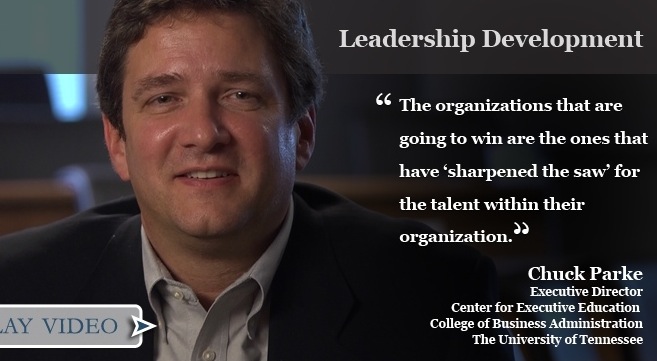“Emerging leaders series” kicks off in August
By Jeff Keeling
So your company has checked off all the right boxes. Supply chain management, purchasing management, lean principles – pick a road to more effective operations, and you’ve taken it. Not so fast, say the folks at the Graduate and Executive Education Program in the University of Tennessee’s College of Business Administration. The people you’re relying on to take your company into the future may be great at what they do, but are they ready to lead?
For a couple dozen middle management types in the Tri-Cities, the answer should be a resounding yes after this fall and winter’s “Emerging Leaders Series” offered by the UT program and featuring nine faculty members with a broad array of experiences and talents. A relatively new offering, the Emerging Leaders Series will have a run in Kingsport starting in late August, with two-day, once-monthly sessions through January.
Management, which UT also teaches through its executive programs, is crucial to good company performance, but it shouldn’t be confused with or practiced apart from leadership. So says Ron Solmonson, the director of UT’s leadership and management development programs.
“Leadership is trying to inspire people to use the management that’s been in place to create a great product, or to get them beyond just doing what is expected. That really speaks to the heart.”
While its results may be a bit harder to quantify than, say, the effect of specific changes in a company’s supply chain management, Solmonson says the long-term benefits of well-trained leaders are just as impactful on the bottom line. Whether it’s from lower turnover, higher productivity or better interdepartmental cooperation, to name a few, he says an improved company performance is almost sure to emerge from the cultivation and support of good leaders. Your company may have one of the top experts in the state on lean manufacturing running a division, but if that person lacks leadership skills, underperformance is likely.
“Putting all those management tools in place doesn’t mean your people are going to be any better as employees,” Solmonson says. “Leadership is about effectiveness, to draw out and inspire people to really want to do well at work instead of just showing up.”
Companies will want to send their most promising new leaders and high potential employees, Solmonson says. To help them get the most out of the program without falling behind at work, the course – which costs a total of $7,500 – is broken up into six, thematically based two-day sessions that are roughly a month apart.
“Folks won’t come back to work so far behind, yet it’s long enough that we’re able to dig into some of the meatier subjects and do it justice,” Solmonson says.
The program will begin with a session called “Foundations of Leadership” Aug. 21-22. That will be followed by “Planning and Negotiating (Sept. 25-26); Making Sense of the Numbers: Managerial Accounting (Oct. 16-17); Talent Management Strategies and Solutions (Nov. 13-14); Leadership Communication (Dec. 11-12); and “Leading for Impact” (Jan. 15-16).
Faculty members include Cindy Raines, the director of communications in UT’s College of Business and Administration; Allen Pannell, an executive consultant; Chuck Parke, the Graduate and Executive Education program’s executive director; Elaine Seat, a design engineer; James Reeve from UT’s Department of Accounting and Information Management; Michael McIntyre, a management consultant and corporate trainer with a background in leadership development and organizational psychology; Alex Miller of UT’s Department of Management; and additional program faculty members Laurie Stulberg MacNair and Hallerin Hilton Hill.
“It really gets you ready to be a good solid leader in middle management,” Solmonson says. “A lot of it’s going to be, learn about yourself, your own styles, learn about how your styles impact other people and how to combine that knowledge to make that organization better because you’re a better leader.”
Solmonson admits that UT’s Executive Education program isn’t the only option for leadership training, but he says the university will put its track record up against any academic competitor or someone from the private sector. UT was an early leader in Six Sigma education, and consistently ranks high nationally for subsets of its programs, including supply chain management. The focus on Tennessee is a plus, as well, he says, and most consultants can’t match the breadth of expertise that nine different faculty members provide.
The end result, Solmonson says confidently, will be an inspired crop of young leaders (or reinvigorated experienced ones) ready to get the most out of themselves and others.
“Generally good leaders are also innovators, because they’re more in touch with the folks that they’re working with and they’re more apt to listen and bubble up good ideas and capture best practices.”
Learn more about the upcoming program at execed.utk.edu/emergingleaders.




